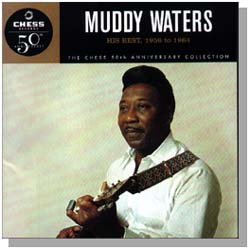![[Metroactive Music]](/music/gifs/music468.gif)
![[Metroactive Music]](/music/gifs/music468.gif)
[ Music Index | Metro | Metroactive Central | Archives ]
Chess-Deep Waters
Muddy Waters leads the way on a new collection of classic Chess blues albums
By Nicky Baxter
Some people have called Leonard and Phil Chess visionaries who recognized the potential in the visceral blues of post-WWII Chicago. Others have branded the Chess brothers as exploiters who took advantage of the artists who created that music. Still, they were indisputably instrumental figures in the development of Chicago blues.
The Chess brothers, with the invaluable assistance of bassist/producer/songwriter Willie Dixon, developed an instantly distinguishable sound that had one foot in the Mississippi Delta and the other in Chicago's fast-paced night life. MCA has released a series of discs in commemoration of Chess Records' 50th anniversary, most notably Chess Blues Classics, 1947 to 1956 and Muddy Waters: His Best, 1947 to 1955. Waters dominates both (as well as another disc covering the years 1956 to 1964), and rightly so.
More than any other musician, Muddy Waters has come to be the most closely identified with Chess Records. The grand poobah of electric blues, Waters is the idiom's towering figure. Without him Chess would be a mere footnote in pop history.
Muddy Waters: His Best, 1947 to 1955 is a raucous walk on the Windy City's wild side: "Hootchie Kootchie Man," "I Can't Be Satisfied," "Rollin' Stone" and a wagonload of other chartmakers are included in this compilation. What amazes is the sheer vibrancy of this music; it's almost impossible to ignore the primal power of, say, "I Just Want to Make Love to You," penned by Willie Dixon and featuring an all-star supporting cast--Jimmy Rogers, guitar; Little Walter, harmonica; Otis Spann, piano; Fred Below, drums; and Dixon on bass.
Even more astonishing is Waters' performance of "I'm Ready,'" another Dixon number. There's nothing slick or stylized about his singing; Waters' roar is a force of nature. And if you thought that the hip-hop generation invented braggadocio, check the lyrics: "I got a ax-handled pistol on a graveyard frame/that shoot tombstone bullets, wearin' balls and chains. I'm drinkin' TNT, smoking dynamite/I hope some screwball start a fight." Below's drumming is just as belligerent, exploding like cherry bombs at the conclusion of every verse.
Though Waters is best known for his ability to bully a song into submission, he could also be playful, as "Sugar Sweet" demonstrates. Set to a spry, leg-shaking beat, Waters' singing is almost lighthearted.
"Mannish Boy" may be the definitive Waters song. Co-written by Waters and Bo Diddley, "Mannish Boy" is a roaring declaration that the shackles are off, and anyone dumb enough to disagree is asking for trouble (it is, perhaps, no coincidence that the tune was written in 1955; a year earlier, desegregation had been outlawed).
The accompaniment is superb; Little Walter's harp, Rogers' guitar and Francis Clay's drums thump out a tremendous racket, insistent and demanding. This song has been covered by countless rock artists, none of whom have managed to capture the fire and conviction of the original.
And the Mississippi-born musician was just that: an original. It goes without saying that no one has found a way to play his way past Muddy Waters' outsized contribution to the genre. Even in death, he is the blues.
[ Metro | Metroactive Central | Archives ]

Mannish Boy: The Chess 50th anniversary CD releases
are dominated by Muddy Waters.
Web exclusive to the August 7-13, 1997 issue of Metro.